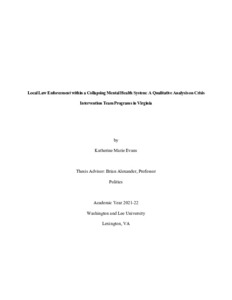| dc.rights.license | In Copyright | en_US |
| dc.creator | Evans, Katherine Marie | |
| dc.date.accessioned | 2022-06-23T15:42:10Z | |
| dc.date.available | 2022-06-23T15:42:10Z | |
| dc.date.created | 2022 | |
| dc.identifier | WLURG38_Evans_POL_2022 | |
| dc.identifier.uri | http://hdl.handle.net/11021/35902 | |
| dc.description | Thesis; [FULL-TEXT FREELY AVAILABLE ONLINE] | en_US |
| dc.description | Katherine Marie Evans is a member of the Class of 2022 of Washington and Lee University. | en_US |
| dc.description.abstract | The Crisis Intervention Team (CIT) model is a globally recognized and implemented jail diversion program that improves local law enforcement response to individuals with mental
illness or substance use disorder (MISUD). Despite the decentralized nature of the model, several states have implemented statewide CIT programs. Virginia was the first state to mandate every locality to participate in a CIT program through state law. This study examines the mechanisms, characteristics, and effects of CIT programs on law enforcement using interview data from local law enforcement officers (n = 24) and CIT Coordinators (n = 3) throughout the Commonwealth. The results suggest that officers strongly endorse the application and benefits thereof despite CIT's practical limitations, such as substantial resource and staffing shortages and inefficient policy constraints. Officers welcome this evolution of law enforcement as CIT programs normalize the use of de-escalation and communication during encounters involving people with MISUD. Officers find that severe shortages in behavioral health services resulting from chronic disinvestment cannot be resolved or managed using CIT alone. Dramatically expanding Virginia's behavioral health systems and establishing mental health providers as the primary first responders for behavioral health crises will reduce the growing demand and strain on law enforcement. The policy implications of these findings are discussed in relation to enhancing public safety and health outcomes. | en_US |
| dc.format.extent | 107 pages | en_US |
| dc.format.extent | 107 pages | en_US |
| dc.language.iso | en_US | en_US |
| dc.rights | This material is made available for use in research, teaching, and private study, pursuant to U.S. Copyright law. The user assumes full responsibility for any use of the materials, including but not limited to, infringement of copyright and publication rights of reproduced materials. Any materials used should be fully credited with the source. | en_US |
| dc.rights.uri | http://rightsstatements.org/vocab/InC/1.0/ | en_US |
| dc.subject.other | Washington and Lee University -- Honors in Politics | en_US |
| dc.title | Local Law Enforcement within a Collapsing Mental Health System: A Qualitative Analysis on Crisis Intervention Team Programs in Virginia (thesis) | en_US |
| dc.type | Text | en_US |
| dcterms.isPartOf | RG38 - Student Papers | |
| dc.rights.holder | Evans, Katherine Marie | |
| dc.subject.fast | Psychiatric emergencies | en_US |
| dc.subject.fast | Crisis intervention (Mental health services) | en_US |
| dc.subject.fast | Police services for the mentally ill | en_US |
| dc.subject.fast | Virginia | en_US |
| local.department | Politics | en_US |
| local.scholarshiptype | Honors Thesis | en_US |
